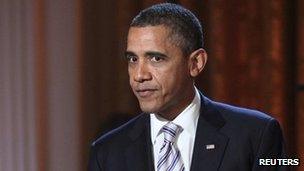Barack Obama seeks to change US corporate tax code
- Published

The US president has seen recent success on extending the payroll tax cut
US President Barack Obama is proposing cutting the US corporate tax rate from 35% to 28%, and closing loopholes, as part of a larger push for tax reform.
Announcing the plan, the US treasury secretary called the tax code loopholes "fundamentally unfair".
Republicans also propose lowering rates, but Mr Obama's plan is thought to have few chances of becoming law.
Correspondents say the president is using the plan to spark a debate on tax reform in an election year.
The plan does not include any overhaul of the individual tax code.
"Our current corporate tax system is outdated, unfair, and inefficient," Mr Obama said in a statement.
"It is unnecessarily complicated and forces America's small businesses to spend countless hours and dollars filing their taxes."
Treasury Secretary Timothy Geithner also called the current system inefficient, describing it as bad for job-creation.
He said the White House and Treasury plan, external would make the tax system more globally competitive and eliminate "fundamentally unfair" loopholes.
"We want to restore a system in which American businesses succeed or fail based on the products they make and the services they provide, not on the creativity of their tax engineers or the lobbyists they hire."
Loophole tax rate
The US currently has one of the top corporate tax rates in the world, but loopholes and other subsidies mean many companies pay a much lower effective tax rate.
According to the Congressional Budget Office, total corporate federal taxes represented 12.1% of US profits in 2011.
Republican Representative Dave Camp and presidential hopeful Mitt Romney have proposed a 25% rate, while other Republican candidates have suggested rates as low as 12.5%.
While both parties have expressed interest in removing tax loopholes, there is disagreement on which subsidies will be need to be cut in order to make up for revenues lost through lowering the standard rate.
Removing the tax loopholes would be likely to raise tax revenues overall, with some companies paying more or less under the current system.
As part of the proposed plan, Mr Obama has suggested lowering the tax rate to 25% for manufacturing businesses and continuing research and development-based tax credits.
While the announcement fleshes out promises made in Mr Obama's January State of the Union address, it leaves certain key details, like the percentage of a minimum tax on foreign profits, up to Congress.
Correspondents say that the tax proposal - and the deliberate lack of detail in some areas - is a move by Mr Obama to shift responsibility to Congress.
Republicans in the House of Representatives have routinely opposed Mr Obama's legislative plans since winning control of the chamber in the 2010 elections.
- Published16 February 2012
- Published15 February 2012
- Published13 February 2012